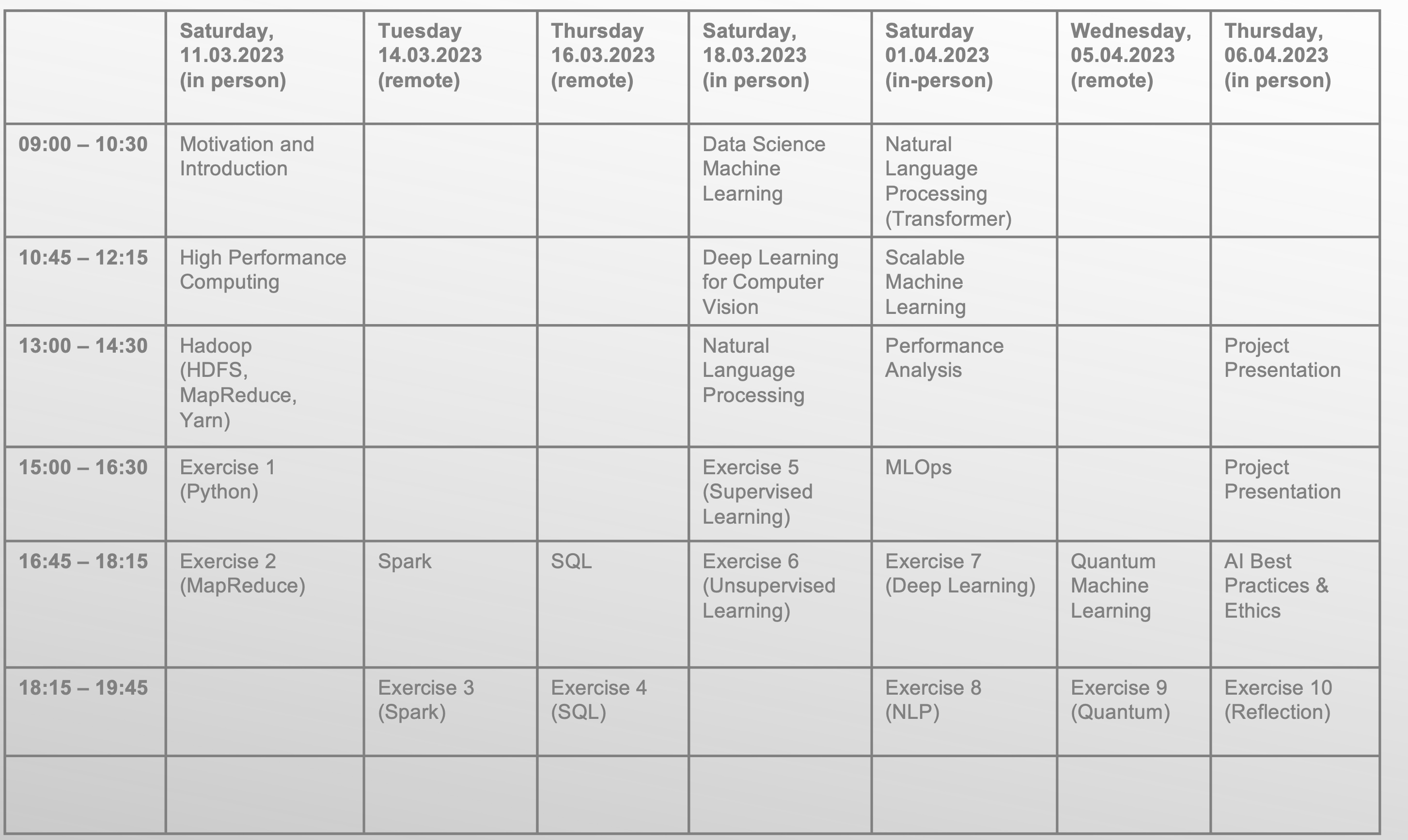Advanced Analytics and Machine Learning (AAML)
Prof. Dr. Dieter Kranzlmüller
Priv.-Doz. Dr. Andre Luckow
Dr. Karl Fuerlinger
News
- 14.05.2023: Room for Exam: The oral exam will take place on May 16, 4:30pm and 7pm in room EU102. (Schedule).
- 09.05.2023: The oral exam will take place on May 16, 4:30pm and 7pm. Please, see schedule for your slot.
- 01.04.2023: There will be an exercise only on April 5, 4:45pm ct. On April 6, 1pm ct. please have a 10 minute project pitch ready..
- 17.03.2023: The topic assignments are downloadable here.
- 05.03.2023: The first lecture will take place on March 11, 9 am c.t. in room 161. If you are still interested in joining, please contact us.
- 04.02.2023: Applications via Uni2Works now open.
- 31.01.2023: Dates: The lecture will take place between March 11 and April 17, 2023.
Content
The ongoing data deluge driven by the increasing digitalization of science, society and industry, leads to a significant increase in demand for data storage, processing and analytics within several industrial domains. Sciences and industry are overwhelmed by the need to store large amounts of transactional and machine-generated data resulting from the customer, service and manufacturing processes. Examples of machine-generated data are server logs as well as sensor data that is generated in finer granularities and frequencies. Further, datasets are often enriched with web and open data from social media, blogs or other open data sources. The Internet of Things (IoT) will further blur the boundaries between the physical and the digital world causing an even further increase in the digital footprint of the world. In this course, we will learn about data applications and their requirements. In this lecture, we will learn about methods and technologies for handle the large data volumes, analytics and machine learning. As part of the exercises students will utilize different frameworks, e.g., MapReduce, Spark and Tensorflow/Keras, to implement different algorithms.
This class will cover the following topics:- Data applications in industry and sciences
- Data-intensive methods in high performance computing
- Large-scale data processing using Spark, Dask, Flink and Ray
- SQL for unstructured data: Hive, Spark-SQL, Presto
- Stream processing: Kafka, Spark Streaming, Flink
- Data science and machine learning: unsupervised and supervised methods, tools (numpy, pandas, scikit-learn)
- Deep learning: convolutional neural networks (Tensorflow, Keras)
- Natural language processing: word embeddings, large language models (RNNs, LSTMs, Transformers)
- Quantum machine learning
- AI Ethics
Audience
The lecture is aimed at master's and bachelor's degree students in the computer science and data science programs.
Exercises
Exercises and code for the exercise are under: https://github.com/scalable-infrastructure/exercise-2023 verfügbar.Scope and Exam
The class comprises 14 modules and 10 exercises (6 ECTS).
The final grade of the class is determined based on a project work and an oral examination. In order to be admitted, all exercise must be submitted and passed. For the lecture to be successful, a grade of at least 4 must be achieved.
Pre-Requisites
Attendance of the lectures on computer networks and distributed systems, operating systems, computer architecture or comparable knowledge required. Programming knowledge in Python and handling Linux command line required.Time and Location
Time / Dates : March 11 to April 17, 2023.
Tentative Schedule:

Location (Hybrid):
- LMU, Oettingenstr. 67, Room 161
- Zoom (Passcode will be send to participants)
Enrollment: The places will be allocated via UniWorX: Uni2Work-Application.
We ask you to describe your previous knowledge in your application and to motivate your participation.
Downloads
Introduction, HPC, Hadoop and Spark Project Topic Assignment Data Science, Machine Learning, Deep Learning, NLP Scalable ML, MLOps, Benchmarks, Quantum Computing, AI Best Practices Exam Schedule
Contact
For questions or inquiries please contact Andre Luckow.